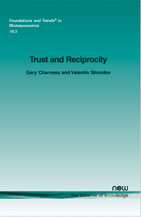Trust and Reciprocity
By Gary Charness, University of California, Santa Barbara, USA, charness@econ.ucsb.edu | Valentin Shmidov, University of California, Santa Barbara, USA, shmidov@econ.ucsb.edu
Abstract
This survey explores the contributions of behavioral economics, laboratory experiments, and field experiments to our understanding of the economics of trust, trustworthiness, and reciprocal behavior. A general summary presenting the evolution of trust and reciprocity, departing from pure self-interest in the understanding of "homo economicus", begins the discussion. Next, an exploration of the games and academic contributions that isolate preferences (including social preferences, altruism, inequality aversion, and guilt aversion) from pledges of trust and from reciprocal behavior provides a foundation for behavior that is often misidentified as trust or conditional upon the actions of another. The survey concludes with a summary of theory and experiments that have identified trust and reciprocity in economics and human behavior.
Trust and Reciprocity
Trust and Reciprocity explores the contributions of behavioral economics, laboratory experiments, and field experiments to our understanding of the economics of trust, trustworthiness, and reciprocal behavior. The monograph begins with a general summary presenting the evolution of trust and reciprocity, departing from pure self-interest in the understanding of "homo economicus". Next, an exploration of the games and academic contributions that isolate preferences (including social preferences, altruism, inequality aversion, and guilt aversion) from pledges of trust and from reciprocal behavior provides a foundation for behavior that is often misidentified as trust or conditional upon the actions of another. The monograph concludes with a summary of theory and experiments that have identified trust and reciprocity in economics and human behavior.
